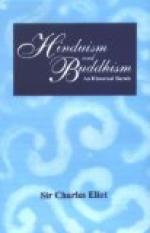The accession of the Liang dynasty and the long reign of its first emperor Wu-Ti (502-549) were important events in the history of Buddhism, for this monarch rivalled Asoka in pious enthusiasm if not in power and prosperity. He obviously set the Church above the state and it was while he was on the throne that Bodhidharma came to China and the first edition of the Tripitaka was prepared.
His reign, though primarily of importance for religion, was not wanting in political interest, and witnessed a long conflict with Wei. Wu-Ti was aided by the dissensions which distracted Wei but failed to achieve his object, probably as a result of his religious preoccupations, for he seemed unable to estimate the power of the various adventurers who from time to time rose to pre-eminence in the north and, holding war to be wrong, he was too ready to accept insincere overtures for peace. Wei split into two states, the Eastern and Western, and Hou-Ching,[627] a powerful general who was not satisfied with his position in either, offered his services to Wu-Ti, promising to add a large part of Ho-nan to his dominions. He failed in his promise but Wu-Ti, instead of punishing him, first gave him a post as governor and then listened to the proposals made by the ruler of Eastern Wei for his surrender. On this Hou-Ching conspired with an adopted son of Wu-Ti, who had been set aside as heir to the throne and invested Nanking. The city was captured after the horrors of a prolonged siege and Wu-Ti died miserably.
Wu-Ti was not originally a Buddhist. In fact until about 510, when he was well over forty, he was conspicuous as a patron of Confucianism. The change might be ascribed to personal reasons, but it is noticeable that the same thing occurred in Wei, where a period of Confucianism was succeeded by a strong wave of Buddhism which evidently swept over all China. Hu,[628] the Dowager Empress of Wei, was a fervent devotee, though of indifferent morality in both public and private life since she is said to have poisoned her own son. In 518 she sent Sung Yun and Hui Sheng[629] to Udyana in search of Buddhist books of which they brought back 175.
Wu-Ti’s conversion is connected with a wandering monk and magician called Pao-Chih,[630] who received the privilege of approaching him at all hours. A monastery was erected in Nanking at great expense and edicts were issued forbidding not only the sacrifice of animals but even the representation of living things in embroidery, on the ground that people might cut up such figures and thus become callous to the sanctity of life. The emperor expounded sutras in public and wrote a work on Buddhist ritual.[631] The first Chinese edition of the Tripitaka, in manuscript and not printed, was collected in 518. Although Wu-Ti’s edicts, particularly that against animal sacrifices, gave great dissatisfaction, yet the Buddhist movement seems to have been popular and not merely an imperial whim, for many distinguished persons, for instance the authors Liu Hsieh and Yao Ch’a,[632] took part in it.




